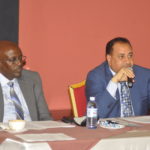Tanzania backed out of its plan to publish a list of names of gay people accused of selling sex online, saying this would ‘destroy evidence’.
Deputy health minister Hamisi Kigwangalla had called to publicise the list, after announcing the plan earlier this month.
“We cancelled the press conference. We are not going to announce the names of (LGBTs) who publicly market themselves for technical reasons,” he wrote on Twitter.
“For strategic reasons and to avoid destroying evidence we will deal with this issue differently and will keep you informed at every step.”
He also said that releasing the names would be akin to ‘freeing a devil in a bottle’.
Kigwangalla’s threat to publish such a list came just days after the government announced it was stopping many privately run health centres from providing Aids-related services, which Health Minister Ummy Mwalimu said promoted homosexuality.
The United States criticised a move which “could impact US government funded programs and impede progress made over the past several years in addressing the HIV/Aids epidemic in Tanzania.”
Gay male sex is punishable by anything from 30 years to life imprisonment under Tanzanian law, but there is no such ban on lesbian relations.
However, politicians have largely ignored the gay community – which was not subject to levels of discrimination seen in other countries such as neighbouring Uganda – until a recent spike in anti-gay rhetoric by the government.
In July last year, the regional commissioner for the port city of Dar es Salaam, Paul Makonda, announced a crackdown against gays, followed by arrests in clubs.
Dozens of men suspected of being gay have been detained and taken to hospital for anal exams to confirm their homosexuality.
Also in July last year the government banned the import and sales of sexual lubricants, which Health Minister Ummy Mwalimu said encouraged homosexuality which led to the spread of HIV/Aids.
Homosexuality is illegal in 38 of 54 countries in Africa, and is punishable by death in Mauritania, Sudan and Somalia, according to Amnesty International.
Uganda in 2014 tried to impose the death penalty on those found guilty of being homosexual, however the controversial law was later repealed.








